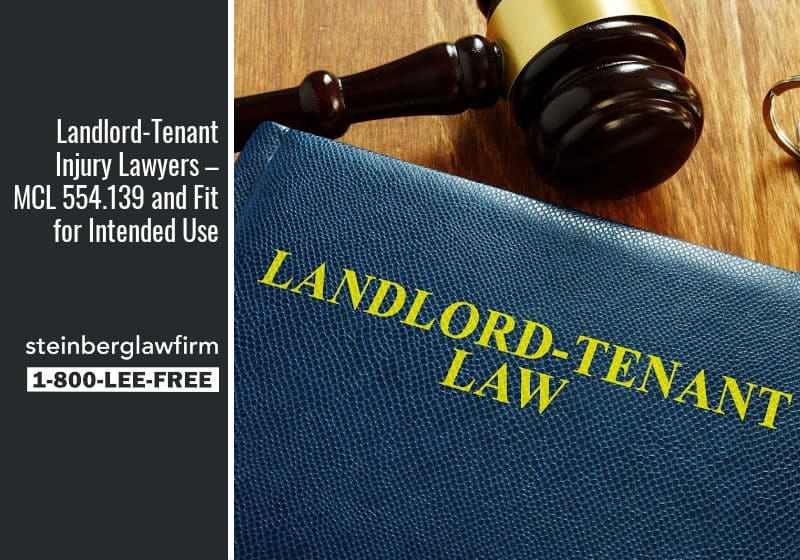
Landlords and property managers have a duty to ensure the safety of their tenants. If a landlord breaches this duty, and a tenant is injured due to the negligence of the landlord or property manager, then the tenant can make a claim for compensation for his or her injuries.
A claim for compensation for injuries suffered by a tenant in Michigan can encompass different elements of damages. These can include:
- Pain and suffering compensation;
- The payment of medical expenses and medical treatment;
- Lost wages;
- Reimbursement of out-of-pocket expenses;
- Payment of future medical care; and
- Compensation for scarring and disfigurement
But just because a renter or tenant is injured on a property owned by the landlord does not mean he or she can get compensation or paid for their injuries. The tenant must provide the landlord was negligent in doing something that caused the injury to occur. A good illustration of this is in a case recently decided by the Michigan Court of Appeals.
In Hoffman v. Red Oak Management Co. Inc., docket no. 349832 (unpublished on 9/17/2020) a renter in an apartment complex in Montcalm County sustained injuries when she slipped and fell on an icy walkway outside of her apartment. The fall occurred at approximately 6:00 pm and it was dark outside.
According to deposition testimony, the area had freezing rain the night before. A maintenance person for the rental property said he salted the walkways the next morning and the plaintiff’s neighbor said she used the walkway without incident that day. However, the temperature that day range from above freezing to well below freezing with some precipitation and freezing rain that started in the mid-afternoon.
The plaintiff filed a lawsuit against the landlord and property manager, alleging they failed to keep the walkway fit for its intended use, in violation of MCL 554.139(1)(a). The landlord filed a motion to dismiss the lawsuit, arguing the walkway was for its intended use, and even if it was not, that the icy conditions was open and obvious. The trial court agreed and dismissed the lawsuit. The plaintiff appealed this ruling.
In a unanimous decision, the Michigan Court of Appeals reversed the trial judge’s ruling and allowed the plaintiff to proceed with her case. In making this ruling, the Court said under MCL 544.139, landlords owe their tenants a duty to ensure all common areas – such as a walkway at an apartment complex – are fit for their intended use.
Although landlords do not have to maintain walkways in an ideal or perfect condition, they must still be fit for their intended use of walking on them. In this case, the entire walkway where the plaintiff fell was covered in ice. There was testimony emergency medical personnel struggled to render aid because of the pervasiveness of the ice on the walkway. Further, there was evidence from an expert meteorologist who opined that the weather data indicated that drizzle and light rain would have caused ice to form on the walkway if not salted prior to the fall.
Taking this evidence together, the Court found that reasonable minds could differ on whether or not the walkway was fit for its intended use, as mandated under MCL 554.139. As such, dismissal of the plaintiff’s case was in error by the trial judge.
The landlord in this case also tried to argue it did not have any notice of the dangerous icy condition, and as such did not have responsibility for the plaintiff’s injuries. The Court of Appeals also shot down this argument. In doing so, the Court noted a landlord is subject to liability for physical harm caused to a tenant by a condition on the land if the landlord knew, or should have known, of an unreasonable risk of harm.
In this case, witnesses observed rain on the day of the accident and that temperatures turned cold, leading to freezing rain. An employee of the landlord was aware the weather was like this and failed to apply more salt or otherwise clear the freezing rain and ice from the walkway. Based on the record, the Court found a reasonable person could find that the landlord or property manager did or could have discovered the icy conditions caused by the precipitation and falling temperatures.
The Lee Steinberg Law Firm, P.C. represent tenants who have sustained personal injuries due to the negligence of a landlord or property manager. Call our dedicated Michigan slip-and-fall accident lawyers, who are standing by ready to answer your questions and assist you on your case.
We never charge a penny until we win your case. Call us toll free at 1-800-LEE-FREE (1-800-533-3733) for a free consultation.

